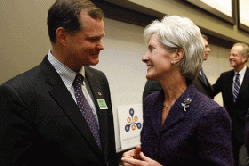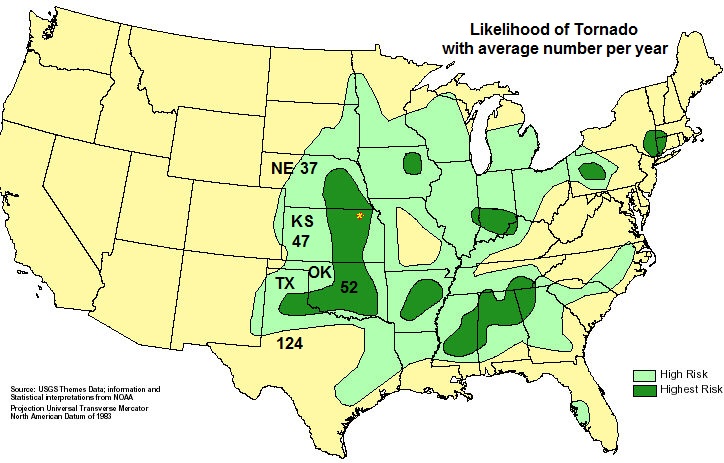KBA urged Homeland Security to locate bioweapons lab in Tornado Alley
 |
| Sebelius and Thornton / 2008 Topeka Capital-Journal image |
Rady Ananda, Contributing Writer
Activist Post
The head of Health and Human Services not only denies that Americans have a right to bodily health and food of their choice, but Kathleen Sebelius is hell bent on spending taxpayer money to promote genetically modified food and drugs. One of her projects, Kansas Bioscience Authority, a publicly funded venture enterprise developed to promote biotechnology, is currently under criminal investigation. CEO Tom Thornton has resigned.
KBA also lobbied the Dept. of Homeland Security for the highly controversial bioweapons and cattle disease lab in the state, along with former Governor Sebelius, now President Obama’s Cabinet Secretary. Under her governorship and full support, the Kansas Economic Growth Act of 2004 passed, funding KBA’s mission with $581 million in tax revenue to develop a bioscience industry in Kansas.
The Johnson County District Attorney’s office recently joined a Kansas Senate committee’s investigation of KBA, which began at least two months ago after spending irregularities came to the attention of state Senators. Part of the alleged wrongdoing includes awarding contracts to out-of-state firms in which former CEO Tom Thornton may have a financial interest, and concern that several executives earn over $100,000 a year – beyond what public service employees generally make. Governor Sam Brownbeck ordered a forensic audit of the public agency, which, until recently, KBA refused. On April 15th, Gov. Brownbeck released the following statement:
Following the Governor’s statement, Thornton stepped down. David Vranicar, who runs Heartland BioVentures, KBA’s commercialization division, now serves as KBA’s interim president and CEO. Throughout the growing controversy, KBA issued no formal statements on its website until May 2nd, when Vranicar assured stakeholders “full transparency and cooperation” with police and other authorities.
Rather than address the criminal issues, former Kansas Governor and KBA Chairman John Carlin complained to the Topeka Capital-Journal that the “Senate committee’s inquiry could jeopardize KBA’s credibility.” However, it’s not an inquiry that damages a firm’s credibility as much as the behavior which prompts it.
Bill Bullard of R-CALF USA, an independent ranchers organization, is one of many who have expressed horror at the site selection for the National Bio and Agro-Defense Facility (NBAF) in Tornado Alley, which KBA and Sebelius both promoted. “Foot-and-mouth disease research currently is conducted on a New York island – Plum Island – where previous, inadvertent releases of the virus have not impacted U.S. livestock.” He sees no reason “to expose our U.S. cattle herd to a heightened risk of disease introduction by locating the NBAF in Manhattan, Kansas.” The proposed NBAF site is located at the orange dot in the tornado map below:
Bullard believes that “politics, greed and corruption” played into the site selection. “We expect this current probe of the KBA to be but the tip of the iceberg,” he added.
As Governor, Sebelius also set up a germ lab task force to lobby DHS to locate the NBAF in Kansas, which sees, on average, 47 tornadoes a year, making it among the highest risk areas in the nation.
By its own admission, KBA was “a driving force on the NBAF initiative.” The lab plans to develop bioweapons to defend against an agro-terrorist attack and to study foot-and-mouth disease. Last November, the National Research Council estimated a 70% chance a pathogen would escape that lab, based on info provided by DHS. The cattle industry could incur $50 billion in losses from an FMD outbreak, the NRC estimated. Regardless, DHS continues to approve the site selection.
It’s not like this hasn’t happened before. Pathogen release by germ labs has caused widespread economic damage in the past, resulting in the slaughter of millions of animals. In 2007, the UK suffered its second outbreak of FMD in a decade, which investigators linked to an FMD research facility. This year, Korea repeated the exercise after an FMD outbreak, slaughtering two million animals, 90 percent of which were disease-free.
Leave a comment
You must be logged in to post a comment.


Be the first to comment on "Sebelius-backed biotechnology firm reorganizing under criminal probe"